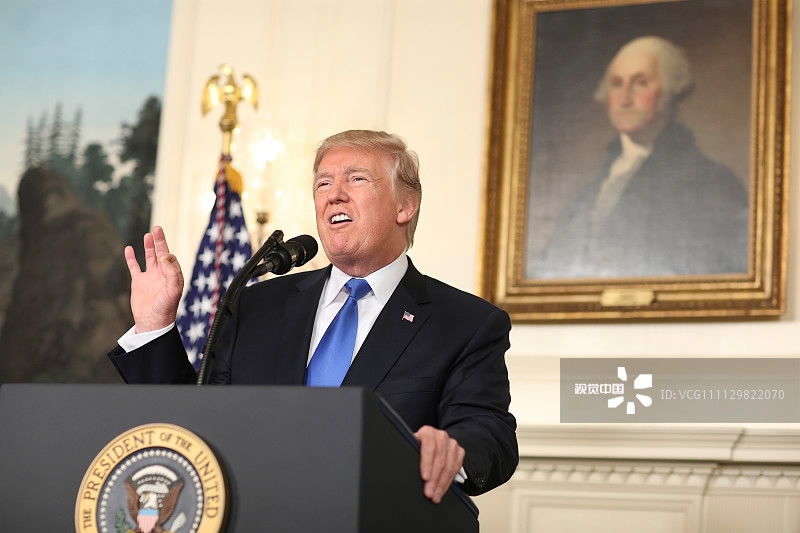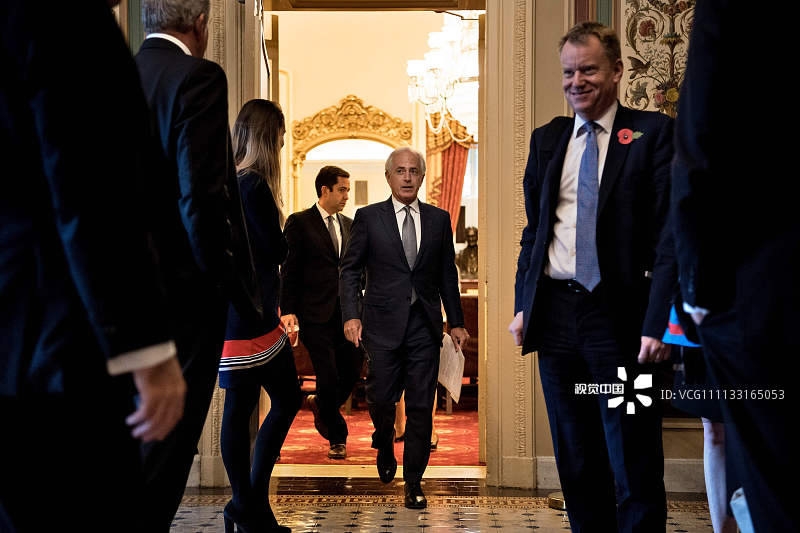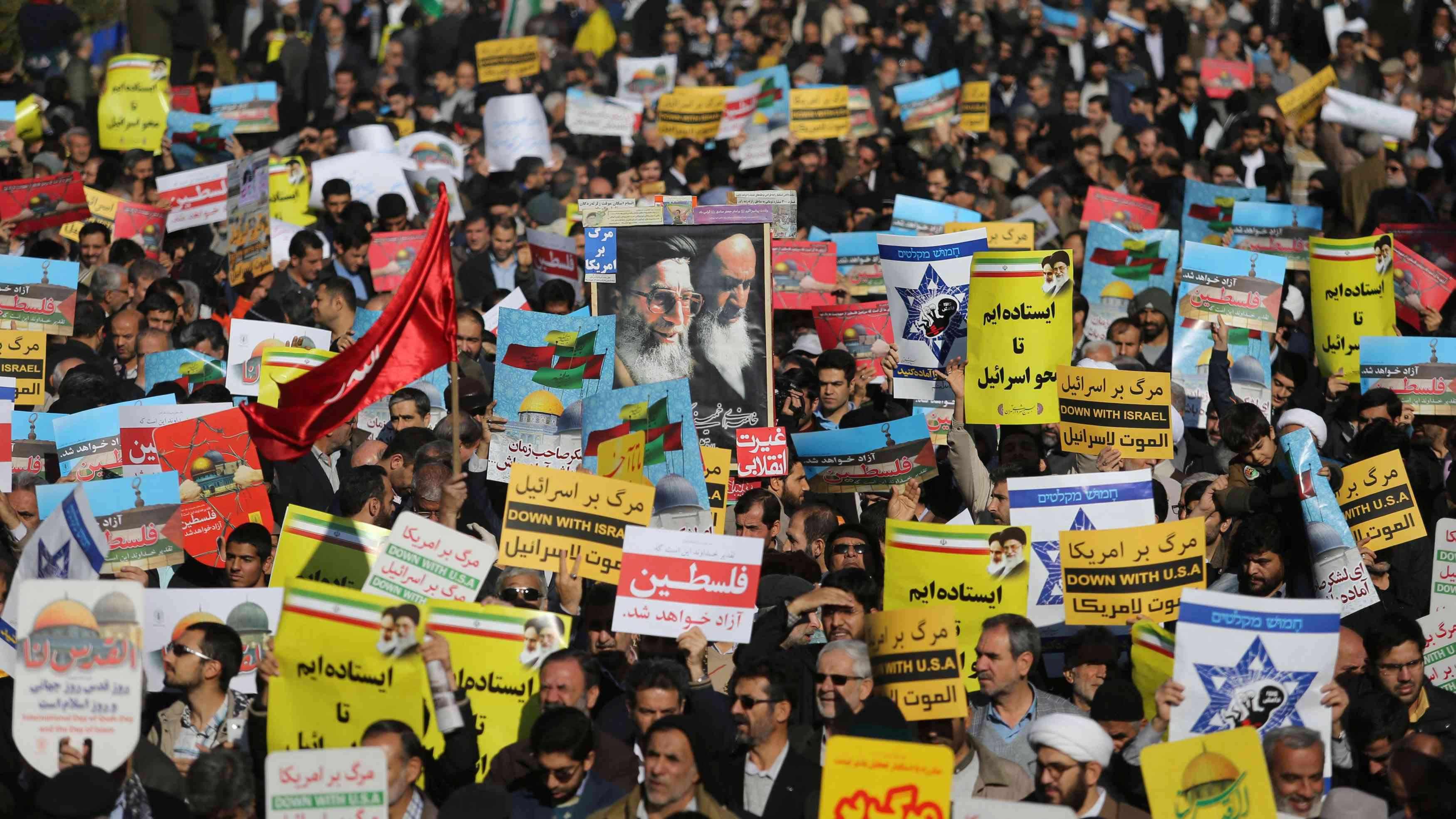The US House of Representatives passed a bill imposing new sanctions on Iran due to its ballistic missile project, a program not covered by the nuclear deal.
The nuclear deal is still accepted by all countries that originally signed it, with the exception of the United States. This is one of the shortcomings of the US and Trump’s policies; they rely on the country’s superpower status and not on what is right or wrong.
The American plan seems to be a mixture of hatred of Middle East peoples, in addition to populist election promises made by Trump on the campaign trail which were undoubtedly erroneous and based on the coverage of serious mistakes which can be covered by military force.

The US president Donald Trump makes a statement on the administration's strategy for dealing with Iran, in the Diplomatic Reception Room in the White House on October 13, 2017 in Washington, DC. / VCG Photo
The US president Donald Trump makes a statement on the administration's strategy for dealing with Iran, in the Diplomatic Reception Room in the White House on October 13, 2017 in Washington, DC. / VCG Photo
No change could take place as a result of the US House of Representatives bill and the problem does not need a great deal of explanation.
Of course, this would further exacerbate the already tenuous US-Iranian relationship, but American decision-makers, who do not often appear in the media, do not see this as a problem. The United States intends to exploit the shaky relationship with Iran to encourage Arab states, mainly Gulf countries, to increase aggressive tensions with Iran.
That is the strategy of the United States; to create problems in and around Israel and continue to reap the benefits of his “jobs, jobs, jobs” policy.
The more the United States creates problems in the Middle East, the greater the number of jobs that are created in the US and in allied countries.

The US Senator Bob Corker (R-TN) leaves after a meeting with Britain's Foreign Secretary Boris Johnson on Capitol Hill November 8, 2017 in Washington, DC. The British Foreign Secretary made the trip aiming to persuade the US congress not to impose sanctions on Iran. / VCG Photo
The US Senator Bob Corker (R-TN) leaves after a meeting with Britain's Foreign Secretary Boris Johnson on Capitol Hill November 8, 2017 in Washington, DC. The British Foreign Secretary made the trip aiming to persuade the US congress not to impose sanctions on Iran. / VCG Photo
The suffering of people in the Middle East, including the Jews, is used boldly by the superpowers, particularly the United States, as a tool to save the economy and bring other benefits.
What is odd is the way Iran and the Arab Gulf countries react to the lost wealth on both sides, while at the same time failing to find a way out.
Some believe that the real implementation of democracy will certainly help to make a significant change that would impact the current situation which apparently seems to bringing destruction to almost every country except Israel.

A general view of Jerusalem's Old City shows the Western Wall, Judaism's holiest prayer site, in the foreground as the Dome of the Rock, located on the compound known to Muslims as Noble Sanctuary and to Jews as Temple Mount, is seen in the background December 10, 2017. /Reuters Photo
A general view of Jerusalem's Old City shows the Western Wall, Judaism's holiest prayer site, in the foreground as the Dome of the Rock, located on the compound known to Muslims as Noble Sanctuary and to Jews as Temple Mount, is seen in the background December 10, 2017. /Reuters Photo
China and Russia, extending help in recognition of the human rights issue could be the suggestion that benefits the people in the Arab states, in China or in Russia? Would it be a new era of fulfilling dreams for both Arab people and Chinese people? Would it move tensions from Iran-Arab states-USA to China-USA? Would this geo-economy-political interpretation need time to take effect while meanwhile destruction in Arab countries is the true reality and the true future?
The other question is whether Iran has already adopted its policy in the face of endless tensions with the United States. Iran is becoming more and more popular and accepted among Arab peoples, and in Iran's view such progress has been going on for several decades, which will justify the sacrifice of sanctions.
Sanctions can also be beneficial for Iran and sanctions can be beneficial for the United States. So in the end it is the Arab states that are losing while Israel is stable. That is the substance of the whole issue.
(Marwan Yassir is a senior political analyst from the Middle East and based in Beirut Lebanon. The author’s opinions are his own and do not necessarily reflect those of CGTN)





